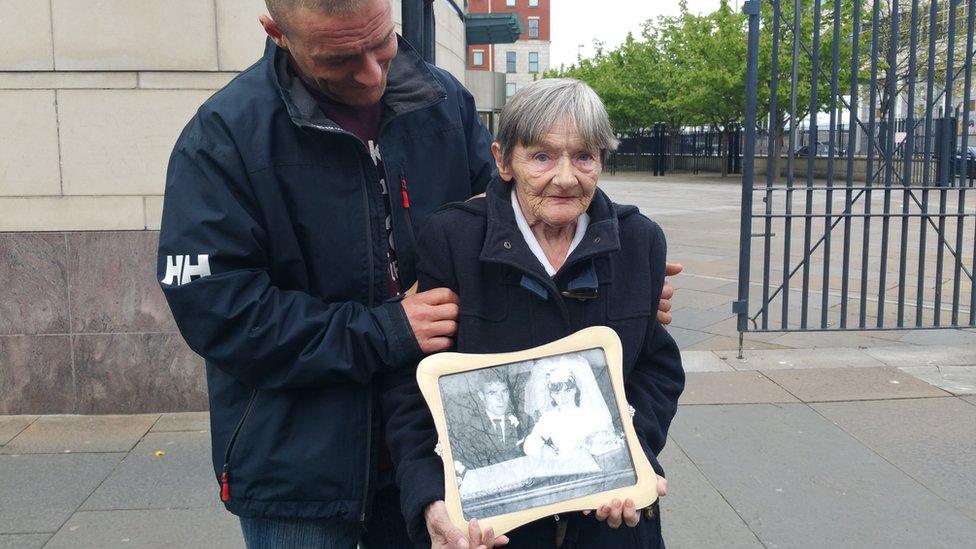Bernard Watt: Lethal force not justified, coroner rules
- Published

Bernard Watt's widow, Teresa, and her son, Sean, at the inquest into his shooting in Belfast
The coroner at the inquest in to the shooting of Bernard Watt has ruled that soldiers were not justified in their use of lethal force.
The 28-year-old died after being shot by the Army during a riot in Ardoyne, Belfast, in February 1971.
The coroner said that Mr Watt was not a member of any paramilitary organisation.
He also ruled that Barney Watt was not holding any explosive device when he was shot.
Unanswered questions
However, addressing the Watt family, he said many questions remained unanswered.
The coroner began his delivering his findings by dismissing evidence heard earlier from a witness, John McLaughlin, as unreliable.
Mr McLaughlin, who was 14 at the time, told the inquest remembered seeing a man standing with his hands in the air before hearing a crack and then he fell to the ground.
He contacted a lawyer of the Watt family after his son told him of newspaper reports about the inquest.
Those reports said soldiers had given statements saying Mr Watt was holding a bomb when he was shot.
Bernard Watt, 28, was shot by the Army during a riot in Belfast's Ardoyne area in 1971
Speaking via video link, Mr McLaughlin described leaving his home at the time to "get out of the house" and walked down Chatham Street.
He told the inquest he was clearly able to see Mr Watt due to a Saracen being alight.
He said he saw Mr Watt staggering and holding a lamp pole.
He saw him take his hands off the pole and put his hands up in a "surrender motion" and was shouting.
Mr McLaughlin said he then heard a crack and the man fell to the ground and was taken by two men to a nearby house.
Nightmares
He says he left Belfast a year later and has suffered post-traumatic stress disorder (PTSD) since.
Mr McLaughlin said he has had regular nightmares about the incident and said that after hearing the reports he had to get involved, had to tell the truth and not to be a coward.
On Monday, the first day of a fresh inquest into his death, statements from four soldiers, made at the time, were read out.
One of the soldiers claimed when he shot the man allegedly holding a bomb, he dropped the device which "exploded and blew him down the street".
Mr Watt's family dispute the soldiers' version of events and his widow told the inquest he had no links to paramilitaries.
The first inquest into his death was held in July 1971 and resulted in an open verdict.
The current inquest was ordered in 2012 by Attorney General John Larkin QC - one of a number of controversial Troubles killings by the security forces which are being re-examined.
Counsel for the coroner told the court there had been difficulties in tracing and identifying soldiers involved in the case.
In February, the Ministry of Defence defended a Parachute Regiment Facebook appeal asking former soldiers for information about Mr Watt's killing.
- Published24 April 2017
- Published3 February 2017